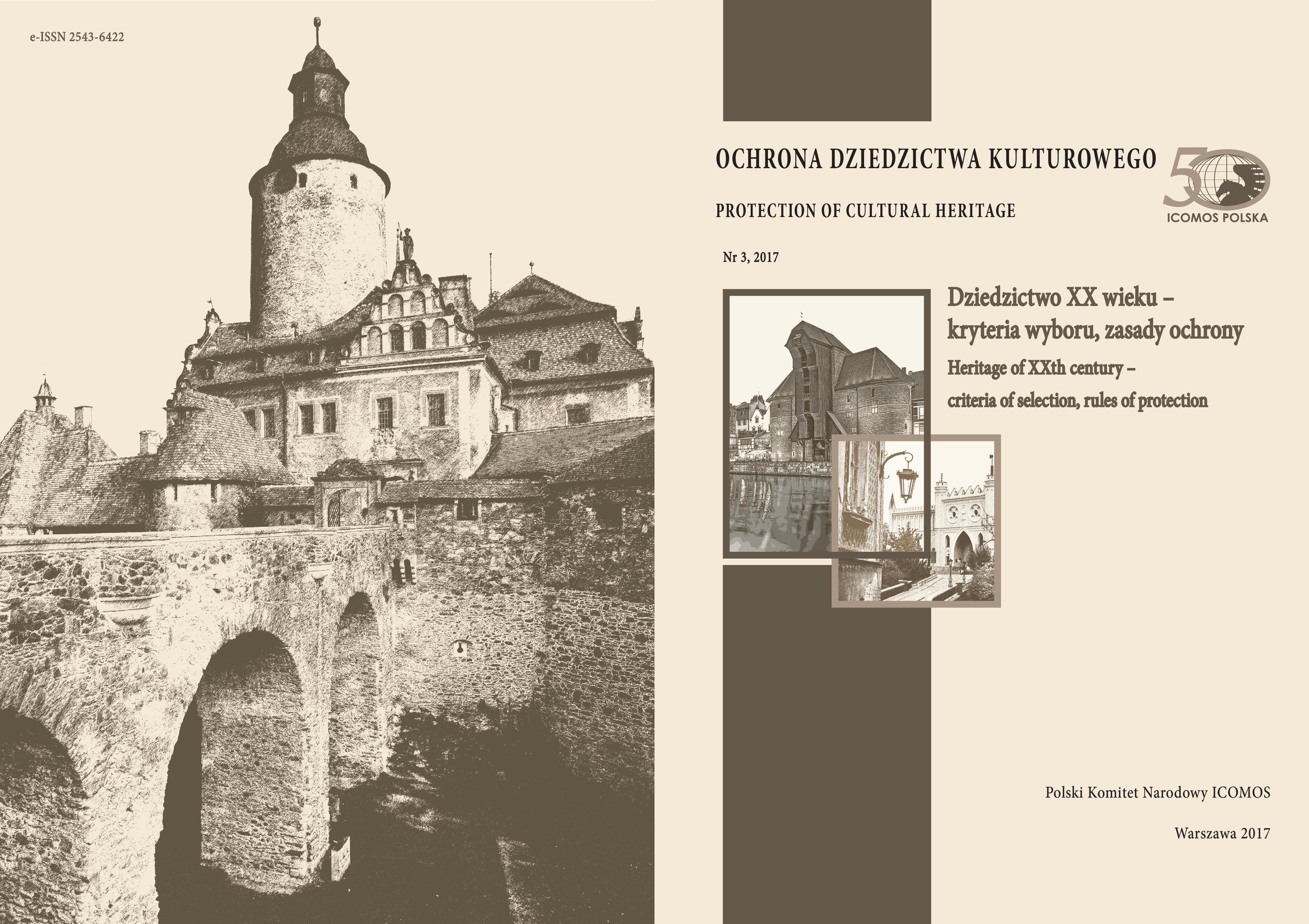Industrial heritage - unwated heritage - unknown heritage
Article Sidebar
Issue No. 3 (2017)
-
Protection of contemporary cultural goods in Lodz planning documents - defining the resource and rules of protection
Maria Dankowska7-18
-
Conservation issues and assumptions for the protection of objects of the former KL Auschwitz-Birkenau
Jolanta Banaś-Maciaszczyk, Rafał Pióro19-28
-
Copyright protection of the 20th century cultural heritage
Wojciech Kowalski29-44
-
The legacy of post-war architecture in Poland as a record of political, social and economic changes
Małgorzata Rozbicka45-68
-
Protection of cultural goods in the 2nd half of the XXth century in Silesia. Urban design, architecture, sculpture, mural
Helena Jadwiszczok-Molencka, Jacek Molencki69-85
-
How young can a monument be? The normative premises of stating the "validity" of immovable monuments
Marek Świdrak87-94
-
Authenticity versus sharing. Boundaries of compromises in the preservation of the former Auschwitz-Birkenau camp
Anna Łopuska95-106
-
Evaluation of the value of modernism monuments from the 1st half of the XXth century. Proposals of the classification methods
Jakub Lewicki107-124
-
Modernism as a particularly important Polish 20th century heritage. Criteria for selection and protection of modernist resource on the example of Stalowa Wola architecture
Grażyna Stojak125-131
-
Searching for criteria for the evaluation of modern wall paintings in historic churches in Poland
Małgorzata Korpała133-145
-
Industrial heritage - unwated heritage - unknown heritage
Jacek Dąbrowski147-160
-
Legacy of modernity in Japan - categories of valuation and examples
Waldemar J. Affelt161-178
-
Monuments of modernism as a defined resource of architectural heritage in the context of post-war facilities protection
Maciej Czarnecki179-186
Main Article Content
DOI
Authors
Abstract
Industrial heritage is often treated as a worse category of heritage itself. The cause of this state of affairs should be seen in the lack of necessary technical knowledge (“technical component”)and misunderstanding of the value of industrial heritage. The consequence of it is accepted or even intentional displacement.
Any attempt to describe the heritage of the industry by using an art historian’s scientific and conceptual approach is a mistake. It is a “technical component” of the research that shows an extremely significant value in the process of the proper recognition of the industrial heritage.
It allows to understand the relationship between the shape, form and the location of industrial buildings with their machines and devices conditioned by the nature of the technological process. It also allows to understand the relationship between the spatial layout of the industrial complex and the communication requirements inside the factory and its connection with the outside world.
The legacy of industry is governed by four fundamental change’s directions:
– revitalization,
– restoration,
– abandonment,
– liquidation.
Revitalization or restoration often takes place in the most brutal way – demolition of everything that is a historical remnant of a factory’s layout and the erection of a shopping centre on such a “tidy” site. Furthermore, the old name such as “printing house”, “brewery”, “manufactory” is frequently preserved. There are also positive examples of revitalization, e.g. the right approach to the authenticity of the historic industrial construction.
Abandonment and liquidation deny the right of the industrial heritage existence, declining any
value of it.
Keywords:
References
Adamska Z., Kompleks przemysłowy z nową funkcją – szansa na przetrwanie dziedzictwa, czy zatarcie jego wartości?, [w:] B. Szmygin (red.), Wartość funkcji w obiektach zabytkowych, Warszawa 2014.
Affelt W., O różnorodności form wyrazu kulturowego technofaktów i ich znaczeniu, [w:] B. Szmygin (red.), Ochrona wartości w procesie adaptacji zabytków, Warszawa 2015.
Affelt W., O wartościowości architektury przemysłowej (i nie tylko…), [w:] B. Szmygin (red.), System wartościowania dziedzic¬twa. Stan badań i problemy, Lublin – Warszawa 2015.
Affelt W., Program funkcjonalno-użytkowy rewitalizacji zasobu dziedzictwa techniki wobec jego wartościowości i pamięci kulturowej [w:] B. Szmygin (red.), Wartość funkcji w obiektach zabytkowych, Warszawa 2014.
Dąbrowska J., Zamierzenia adaptacji fabryki przy ul. Kościuszki na Muzeum Fajansu, [w:] Rewitalizacja zabytków techniki, Nowe życie w starych zakładach przemysłowych, Materiały z konferencji, Włocławek 9–10 czerwca 1994 r., (red.) M. Smoktunowicz, Warszawa 1994.
Dąbrowski J., Zakłady „Telefunkena” na Warszawskim Kamionku cz. I, Wiadomości Konserwatorskie, nr 51/2017.
Decyzja Łódzkiego WKZ nr WUOZ-640/295/2010 z dn. 10 września 2010 r. (nr rej. A/97).
Decyzja Mazowieckiego WKZ nr 1233/2013 z dn. 28 października 2013 r.
Decyzja Mazowieckiego WKZ nr 216/2012 z dn. 13 marca 2012 r. (nr rej. A-1064).
Decyzja Mazowieckiego WKZ nr KI_VIII/746/1195/82 z dn. 28 kwietnia 1982 r. (nr rej. A-1195).
Decyzja Pomorskiego WKZ nr PWKZ-5340/14/99/9453 z dn. 6 grudnia 1999 r. (nr rej. A-1206).
Decyzja Pomorskiego WKZ nr PWKZ-8340/7/2002/6793 z dn. 4 października 2002 r. (nr rej. A-1222).
Decyzja Pomorskiego WKZ nr RD.5140.52.2016.AK.20 z dn. 2 listopada 2016 r. (nr rej. A-1936).
Decyzja Pomorskiego WKZ nr RD.5140.5-6.2014.JP z dn. 14 lutego 2014 r. (nr rej. A-1735).
Decyzja Wielkopolskiego WKZ nr KLIII-A251-1330-84 z dn. 21 września 1984 r. (nr rej. A-251).
Decyzja Włocławskiego WKZ nr KL-5340/1/81 z dn. 8 grudnia 1981 r. (nr rej. 84/A), nr rejestru zmieniony przez Kujawsko-Pomorskiego WKZ na A/281/1–4 (zawiadomienie z dn. 23 listopada 2011 r.)
Karta Ateńska, [w:] Vademecum Konserwatora Zabytków, Warszawa 2015.
Karta ICOMOS Ochrony szlaków kulturowych, Quebec 2008, [w:] Vademecum Konserwatora Zabytków, Warszawa 2015.
Karta z Burra, [w:] Vademecum Konserwatora Zabytków, Warszawa 2015.
Kowalewska A., Fabryki fajansu na tle historii miasta, [w:] Rewitalizacja zabytków techniki, Nowe życie w starych zakładach przemysłowych, Materiały z konferencji, Włocławek 9–10 czerwca 1994 r., (red.) M. Smoktunowicz, Warszawa 1994.
Wspólne wytyczne ICOMOS – TICCIH w zakresie konserwacji obiektów, konstrukcji, obszarów i krajobrazów dziedzictwa przemysłowego (Zasady Dublińskie), [w:] Vademecum Konserwatora Zabytków, Warszawa 2015.
http://www.nid.pl/pl/Informacje_ogolne/Zabytki_w_Polsce/rejestr-zabytkow/zestawienia-zabytkow-nieruchomych/tabelki%20-%20nieruchome/tabelka%20rejestru-28-09-16.xls, (dostęp: 18.02.2017).
http://www.nid.pl/pl/Informacje_ogolne/Zabytki_w_Polsce/rejestr-zabytkow/zestawienia-zabytkow-nieru¬chomych/RAPORT-TABELE.xls, (dostęp: 18.02.2017).
Article Details
Jacek Dąbrowski, Ministry of Culture and National Heritage
ukończył archeologię na UMK w Toruniu, podyplomowe studia w zakresie planowania
przestrzennego na Wydziale Architektury PG, ochrony zabytków techniki na Wydziale Architektury
PWr i ochrony dóbr kultury na Wydziale Architektury PW. Zainteresowania: archeologia miast
i wczesnego średniowiecza, zabytki techniki, prawo ochrony zabytków, statystyka w ochronie
zabytków.






